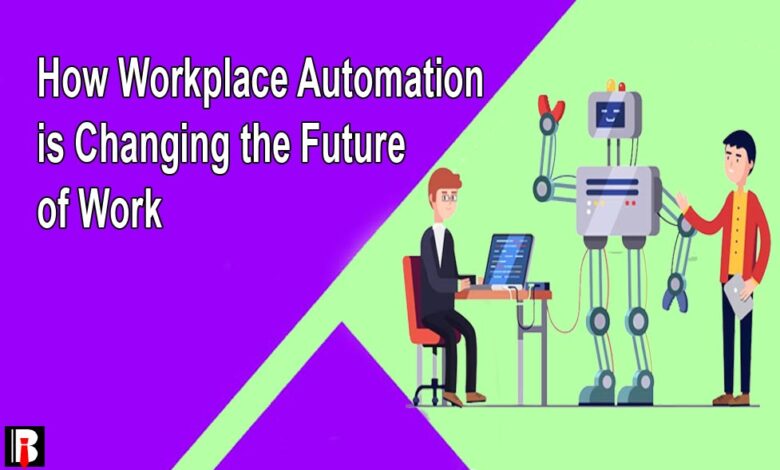How Workplace Automation is Changing the Future of Work

In recent years, technological advancements have resulted in a new era of automation, fundamentally altering the landscape of the modern workplace. Robotics, artificial intelligence (AI), and other automated technologies are transforming business digital processes and changing the nature of work. As we investigate more deeply into workplace automation, it becomes apparent that these changes aren’t just about machines taking over manual Labor. They’re also about altering the very foundation of our work culture and creating new opportunities.
Quick Shortcut Headlines
Effects of Automation on Jobs
The most serious concern about workplace automation is its potential impact on jobs. Although some common and routine tasks are indeed being automated, it’s important to understand that automation sometimes means job loss. Instead, it frequently results in a change in job roles. Human workers can work on more innovative, strategic, and complex projects that call for critical thinking and emotional intelligence, where humans excel as machines take over routine tasks. Automation boosts spending and generates jobs by boosting productivity and lowering costs and prices. But it also results in job losses, especially for those directly replaced by machines and those who compete with them. Since the 1980s, digital automation has contributed to Labor market inequality by creating new jobs while decreasing wages. Workers who can supplement automation often receive higher pay, while those who can replace machines face worsening conditions.
Human-Machine Cooperation
Automation aims to improve human capabilities rather than replace them. Collaboration between machines and people is becoming more prevalent. Robots and artificial intelligence (AI) systems can handle data analysis, produce insights, and even offer suggestions, enabling human workers to make better decisions. This synergy is propelling industries forward in previously unimaginable ways. Companies can boost their levels of productivity and efficiency by combining the advantages of humans and machines. This collaboration also allows workers to focus on more complex tasks that require creativity and critical thinking while machines handle repetitive and mundane tasks. Human-machine cooperation is thus revolutionizing the workforce and opening up new opportunities across various industries.
Increasing and Retraining Skills
The skills needed in the modern workplace must be updated in light of the rise of automation. Both individuals and organizations must concentrate on upskilling and reskilling initiatives if they want to stay relevant. The demand for professionals who can design, manage, and optimize these automated systems is rising as routine tasks become more automated. Programming, data analysis, problem-solving, and adaptability skills are in high demand. Additionally, people must be proactive in continually learning new things and developing new skills to keep up with the quick technological changes. For career advancement and job security, lifelong learning has become crucial. To ensure that their staff members have the skills needed to succeed in a digital workplace, businesses should invest in offering training and development opportunities to their staff.
Convenience and Remote Work

A shift toward more flexible work arrangements is being sparked by workplace automation. The rigid 9-to-5 schedule is losing relevance as routine tasks are automated. Employees are increasingly able to achieve a better work-life balance thanks to remote work and flexible hours. Automation allows tasks to be completed regardless of location or time zone, increasing efficiency and overall job satisfaction. Working remotely eliminates the need to commute, saving workers valuable time and lowering their stress levels. People who work are more productive and satisfied with their jobs are more productive and satisfied with their jobs because of the freedom to work from home or any other location of their choosing.
Enhanced effectiveness and precision
One of the most significant advantages of workplace automation is its increased efficiency and accuracy in various processes. Machines now perform repetitive tasks error-free that were once prone to error. This results in improved product quality, shorter production times, and, ultimately, higher customer satisfaction. Resources can be better allocated and optimized thanks to workplace automation. Businesses can streamline operations and allocate resources more wisely by automating tasks, which boosts productivity and reduces costs. This helps the business and allows staff members to concentrate on more difficult and strategic tasks, which promotes innovation and growth.
Changes in Job Roles
Traditional job roles are evolving due to the changes brought on by automation. Job descriptions today are flexible and dynamic rather than static. Professionals are now expected to possess various abilities, including technical proficiency, creativity, and adaptability. This shift in job roles promotes lifelong learning and personal development, making the workforce more agile and resilient. This shift in job roles necessitates that professionals have strong communication and collaboration skills. Due to the growing use of technology and remote work, people must be able to interact and collaborate productively with coworkers from various backgrounds and locations. As professionals can continuously learn new skills and adjust to shifting industry demands, shifting toward more flexible job roles opens up more career growth and advancement opportunities.
Ethics-Related Matters
Automation in the workplace has undeniable advantages, but moral issues also need to be taken into account. The displacement of certain workers due to automation necessitates measures to ensure a just transition for those affected. Furthermore, questions about data privacy, algorithmic bias, and the role of AI in decision-making must be thoroughly investigated to avoid unwanted impacts. The effect of automation on employee job satisfaction and general well-being raises ethical questions. It is critical to address these concerns to maintain a healthy work atmosphere and ensure that technological advancements align with human values and societal needs.
Conclusion
Workplace automation is not just a passing trend; it is a transformative force that will affect how people work in the future. Businesses and individuals must embrace change and recognize the potential that increasingly sophisticated AI, robotics, and automation technologies offer. Understanding that automation is a tool to enhance human capabilities will help organizations build a more productive, flexible, and innovative workplace. The answer lies in creating a cooperative relationship between people and technology, where both can develop and contribute to a dynamic and bright future of work.




